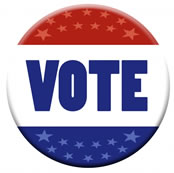It's Civil War!!!
Yesterday the NBC television conglomerate declared that the Iraq War is now a civil war. What's odd about this is that it takes a media outlet to make this declaration and not our government and that it is somehow news just because they were the first of the media corporations to do this. This "epic" decision was initially broadcast on the Today Show by host Matt Lauer in the morning and then discussed throughout the day on sister station MSNBC and the other cable news channels.
George Bush and the White House of course highly disagree with the Iraq War being characterized as a civil war and sent out their minions to the cable news channels to argue their case which was essentially, "it's not a civil war." At least that's all that I could discern. In a sense it was a bit humorous as everyone was scrambling for their dictionaries to look up the phase 'civil war' to try and determine if the Iraq War meets the definition.
The problem is that civil wars like any other wars are never the same. Trying to compare a current war to wars of the past is nothing but an academic exercise that doesn't really address the current war. As time progresses and history continues to roll on, a war in our years is different in so many ways from a war of previous time. Just the type of weapons used advances over time, the type of people involved are different, their politics and ideology is different, the land the war is fought on is not the same. I think it's easier to find differences between wars rather than similarities.
So is the Iraq War a civil war? Sure, why not? It's quite obvious that factions in Iraq are warring against each other, just because we have troops over there fighting to try to keep these factions from killing each other doesn't change that fact.
The White House has given up trying to promote democracy in Iraq (when was the last time you heard that line lately?) and at this point would be happy if Iraq simply had a government that could control their own people. The real problem of the repeated mantra of "we will stand down as the Iraqi's stand up" is that no matter how much we train the Iraqi military to defend their country is that we can't force the members of that military to believe in their government. To get people in the Iraq military to hunt down and kill their fellow citizens for a government they don't understand or believe is going to be valid seems like insanity. In other words, the military must have faith in the future of their country as being united in the face of the fact that Iraq isn't united due to various reasons such as sectarian differences, tribal differences, and the desire for power when the power vacuum opens up.
As anyone that knows me understands, I was against this war before it began, expected this war wouldn't evolve as the "experts" in the White House predicted and have believed that a withdrawal has been the only answer all along. Yes a withdrawal would probably cause Iraqis to kill each other, but since not long after the war began Iraqis have been killing each other. Withdrawal would change little in Iraq except to get our troops out of the way.
Some sort of government will eventually emerge whether it's a central government or broken up into regional nations (such as what happened in Yugoslavia) once we leave. It may take years, it may happen in a relatively short time, but we won't have much effect whether we stay or leave. By leaving, Iraq will probably resolve itself faster than if we stay. We are only delaying the inevitable and always have been. By removing Saddam Hussein who maintained that cruel balance that enabled the country to function as a nation we set in motion these divisions driving the violence.
When the pundits and study groups are advocating bringing in Syria and Iran to discuss Iraq then Bush and company failed in Iraq. By doing that, we would enable Iran and Syria to become power players in the region and I can bet plenty of money that Bush never wanted that. Whether Bush agrees to this scenario and sends out Condoleeza Rice to meet with those countries has yet to be determined, we shall see. The chances that those meetings would turn out to be the answer seem low.
It took about three years or so before general consensus began to agree with me that the Iraq War was a mistake. Now I wonder if I'm on the wrong side (as I always wonder when general consensus agrees with me) and try as I might I can't find another idea besides withdrawal. We were the impetus to the Iraq civil war, I guess we just have to let them have it. We gave it to them, it's unfortunate it was a bad gift.
George Bush and the White House of course highly disagree with the Iraq War being characterized as a civil war and sent out their minions to the cable news channels to argue their case which was essentially, "it's not a civil war." At least that's all that I could discern. In a sense it was a bit humorous as everyone was scrambling for their dictionaries to look up the phase 'civil war' to try and determine if the Iraq War meets the definition.
The problem is that civil wars like any other wars are never the same. Trying to compare a current war to wars of the past is nothing but an academic exercise that doesn't really address the current war. As time progresses and history continues to roll on, a war in our years is different in so many ways from a war of previous time. Just the type of weapons used advances over time, the type of people involved are different, their politics and ideology is different, the land the war is fought on is not the same. I think it's easier to find differences between wars rather than similarities.
So is the Iraq War a civil war? Sure, why not? It's quite obvious that factions in Iraq are warring against each other, just because we have troops over there fighting to try to keep these factions from killing each other doesn't change that fact.
The White House has given up trying to promote democracy in Iraq (when was the last time you heard that line lately?) and at this point would be happy if Iraq simply had a government that could control their own people. The real problem of the repeated mantra of "we will stand down as the Iraqi's stand up" is that no matter how much we train the Iraqi military to defend their country is that we can't force the members of that military to believe in their government. To get people in the Iraq military to hunt down and kill their fellow citizens for a government they don't understand or believe is going to be valid seems like insanity. In other words, the military must have faith in the future of their country as being united in the face of the fact that Iraq isn't united due to various reasons such as sectarian differences, tribal differences, and the desire for power when the power vacuum opens up.
As anyone that knows me understands, I was against this war before it began, expected this war wouldn't evolve as the "experts" in the White House predicted and have believed that a withdrawal has been the only answer all along. Yes a withdrawal would probably cause Iraqis to kill each other, but since not long after the war began Iraqis have been killing each other. Withdrawal would change little in Iraq except to get our troops out of the way.
Some sort of government will eventually emerge whether it's a central government or broken up into regional nations (such as what happened in Yugoslavia) once we leave. It may take years, it may happen in a relatively short time, but we won't have much effect whether we stay or leave. By leaving, Iraq will probably resolve itself faster than if we stay. We are only delaying the inevitable and always have been. By removing Saddam Hussein who maintained that cruel balance that enabled the country to function as a nation we set in motion these divisions driving the violence.
When the pundits and study groups are advocating bringing in Syria and Iran to discuss Iraq then Bush and company failed in Iraq. By doing that, we would enable Iran and Syria to become power players in the region and I can bet plenty of money that Bush never wanted that. Whether Bush agrees to this scenario and sends out Condoleeza Rice to meet with those countries has yet to be determined, we shall see. The chances that those meetings would turn out to be the answer seem low.
It took about three years or so before general consensus began to agree with me that the Iraq War was a mistake. Now I wonder if I'm on the wrong side (as I always wonder when general consensus agrees with me) and try as I might I can't find another idea besides withdrawal. We were the impetus to the Iraq civil war, I guess we just have to let them have it. We gave it to them, it's unfortunate it was a bad gift.


